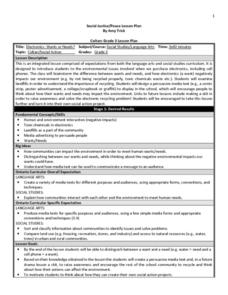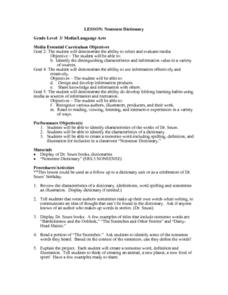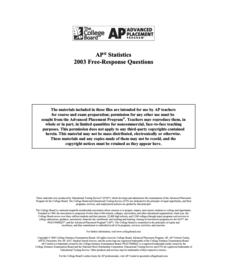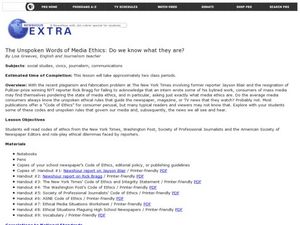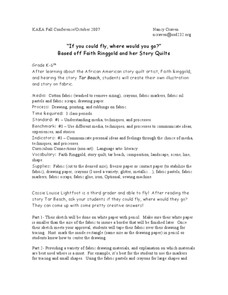Curated OER
Disaster Talk
Young scholars design new devices to help victims of natural disaster communicate with rescue workers, government, media and loved ones. For homework, they write proposals promoting their technology.
Curated OER
Bird Up
Third graders identify basic physical and behavioral characteristics of birds and how they adapt to their environments. To organize and share scientific information with peers. They discuss similarities and differences among birds....
Curated OER
Messages in Art Work
Observe images and discuss what messages they convey. In this critical thinking lesson plan, students determine whether works of art are trying to persuade their audience. They also consider the media and how they communicate messages to...
Curated OER
Electronics: Wants or Needs?
Third graders determine how electronics negatively impact the environment. In this environmental lesson, 3rd graders read the article "Earth Friendly Waste Management", and identify how recycling impacts our environment. Students...
Curated OER
Pathfinders: Using Information Resources
Eighth graders gather and use information on a chosen topic for a hypothetical research paper. They use organizational features of printed text, the Internet, and other media to locate information and choose a specific topic.
Curated OER
Technology as a Design Tool for self-portraits
Students create self-portraits using the technology of digital cameras mixed with other media. Adobe Photoshop is a requirement for this specific three week project. State standards for the arts are addressed.
Curated OER
Nonsense Dictionary
Third graders explore various media. They identify the characteristics of various sources and use that material effectively. Students identify the characteristics of Dr. Seuss' work and the characteristics of a dictionary. They create a...
Curated OER
The Art of Illustrator Eric Carle
First graders use two-dimensional and three-dimensional media and techniques to communicate ideas, experiences, and stories in works of art. They use media and tools in a safe and responsible manner
Sharp School
Career Project 2
Help your pupils find some direction with a career research project. Individuals research three careers, using the included graphic organizers to record their findings. They then create a visual aid on a computer and present their...
Howard Hughes Medical Institute
Scientific Inquiry Using WildCam Gorongosa
How do scientists determine what questions to ask to meet their research goals? Help your class develop an inquiry mindset with a lesson based on studies in the Gorongosa National Park. Partners create their own research questions by...
College Board
2005 AP® Environmental Science Free-Response Questions
Can the increase in meat production keep pace with the increase in population? Individuals analyze data to determine when human populations will exceed meat production at the current rates of increase. They also consider infectious...
College Board
2000 AP® Statistics Free-Response Questions
A little communication goes a long way. Free-response questions from the 2000 AP® Statistics exam require pupils to communicate their results—not just perform calculations. The questions ask individuals to explain, discuss, and interpret...
College Board
2003 AP® Statistics Free-Response Questions
Hypothetically, knowing the structure of a test should help. Pupils use the released free-response questions from the 2003 AP® Statistics exam to become aware of the structure of questions on the test. Half the questions in the set...
Howard Hughes Medical Institute
West Nile Virus: Vectors and Hosts Game
The spread of an infectious disease can be a complicated process. Using a game approach, learners reenact the spread of the West Nile virus. They learn the need for the vector in transmitting the disease and how different organisms react...
Curated OER
Communication, Day 3: Asking What You Want
Mild to moderately disabled secondary students practice asking for what they want. They discuss a scenario, list things they want, then practice asking for those things. Our special needs students need to know how to communicate...
Curated OER
HIV/AIDS & Other STDs, Day 1: Germs & Risk
Assist your secondary special education class for understanding risky behavior, hygiene, and STDs. The class discusses how germs spread, how people get sick, and what needs to be done to prevent the spread of communicable diseases. They...
Curated OER
STD & HIV/AIDS, Day 2: HIV/AIDS - Staying Safe
Decrease risky behavior and inform your secondary Special Ed class about AIDS/HIV. They talk about germs, AIDS, transmission, and staying safe. Developmentally disabled individuals need to be informed about safe sex and disease...
Curated OER
The Unspoken Words of Media Ethics: Do we know what they are?
Students read codes of ethics from the New York Times, Washington Post, Society of Professional Journalists and the American Society of Newspaper Editors. In this Civics lesson, 10th graders role-play ethical dilemmas faced by reporters.
Curated OER
The President and the Press ~ FDR's First Press Conference: March 1933
Students consider that many presidential aides now speak "off the record," in essence conveying a message from the president. They examine why most Presidents have fewer press conferences the deeper they get into their terms of office.
Curated OER
If You Could Fly, Where Would You Go?
Learners explore story quilts. In this cross curriculum literacy and art lesson, students listen to the story Tar Beachand discuss the art form of story quilts as used by Faith Ringgold. Learners sketch their own "Where Would You Fly?"...
Curated OER
Lesson Ten: Your World Without Oil
Young scholars participate in the World Without Oil game as they examine the effects of a prolonged oil shortage. In this oil shortage lesson, students play the online game, World Without Oil, before making an audio clip based on the...
Curated OER
Using the Commentaries in Class
Students examine language and communication by listening to a commentary radio show. In this communications lesson, students listen to Michael Josephson's radio broadcast using the Internet and analyze his words and their meaning....
Curated OER
Online —On Stage—and Action
Use your tablets to participate in a culture-sharing project with a class in a foreign country. Your class can communicate and share ideas with a class in another country, swapping information regarding language and culture. Together you...
Scholastic
It's a Whatchamacallit
Learners formulate new applications for simple machines in an original invention that solves a common problem. They brainstorm ideas for a new product using simple machines and communicate a finished project through an oral, written, and...





